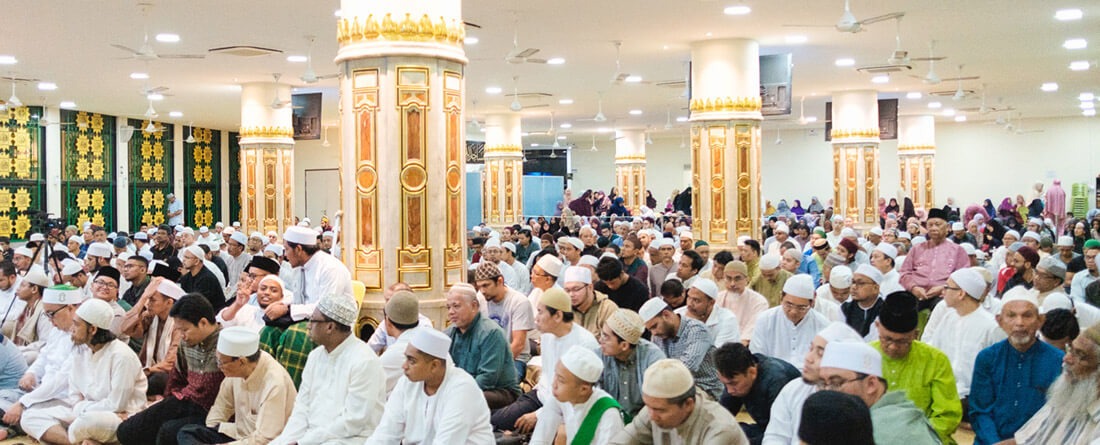newest article

Navigating (Islamic) Faith and Citizenry in Secular Singapore
01 February 2020 10:00 am // Written by Nur Diyana Binte Zait;
Upon Hijrah, when Prophet Muhammad (peace be upon him) stood near the Makkah, he said, “Had I not been driven away from you, I would not have left you.”[1] This was an expression of love by the Prophet for his homeland. Once in Madinah, he (pbuh) prayed for Allah to instil in him the love for Madinah just like how his affection for Makkah: “Allahumma habbib ilayya Al-Madinah ka hubbina li Makkah aw ashadd”.[2]Like the Prophet, it is only natural for Muslim citizens to have endearment towards a country which practises the same values and beliefs, and uphold the Islamic law. But what about Muslims living in a country governed by non-Muslims? Are Muslim citizens allowed to profess their love towards such a country? Should they prioritise their faith over citizenship?
Many Muslim scholars agree that loving one’s country is an act of fitrah (natural). Some even considered it to be part of the Sharia, as the famous saying goes, “hubbul wathan minal iman” which means “love towards one’s country is part of faith”. The scholars, however debated whether it is a hadith or opinions of religious scholars (Ulama). Even those who agree that the verse is a hadith, disputed its legitimacy: whether it is sahih or maudu’ (fabrication). Still, the majority, who included the renowned muhaddith Ibnu Hajar Al-Asqalani, mentioned in his book Fathul Bari that although the saying could not be traced to the Prophet (pbuh), it is sahih in terms of its meaning because the Prophet lived his life upholding the value.[3]
So what does it mean to be a good citizen and a good Muslim? In a 2013 survey by Pew Research Center on The World’s Muslims, it finds that support for upholding Sharia (Islamic law) as the law of the land is often higher in countries where the constitution or basic laws already favour Islam over other religions. These include countries such as Afghanistan, Iraq and Malaysia. By comparison, support for Sharia as law of the land is lower in countries where Islam is not legally favoured, such as in Kazakhstan and Azerbaijan.[4]
Living in secular Singapore
Singapore is one of the few secular countries that enforces the separation of religion and politics to maintain religious harmony. It prides on the society’s religious diversity and regulates religion through legislation such as the Maintenance of Religious Harmony Act.[5] The government even promotes national unity and maintain national identity through religious values.[6]
To maintain harmony is to prefer collectivism to individualism, hence, the government advocates a set of secular shared values (“Our Shared Values”).[7] If a good Muslim (or any religious believer) truly understands his faith, he would find these values to be aligned with his beliefs. It would be no surprise to find that collective morality is expressed in the Qur’an in the terms equality, justice, fairness, brotherhood, mercy, solidarity, compassion, and freedom of choice. For example, the third shared value – family as the basic unit of society – mirrors what Islam taught its believers to hold mothers in high regard as they are the first source of education in a child’s formative years. Further, the fourth value calling for consensus in place of conflict is aligned to how our Prophet would engage in shura with his companions before making big decisions.
Singapore has a governing body that oversees the administration of Muslims in many aspects – Islamic education, issuing of fatwas, collection zakat, and pilgrimage. The government separates certain laws under AMLA to be overseen by Syariah court and ROMM. Muslims in Singapore, despite being the minority, are privileged to be given the respect and honour as religious believers in terms of ritual spaces, mutual understanding, and easily accessible Islamic knowledge.
There is no denying that every government and leadership is far from perfect and more can be done to administer better policies and educating the society in handling racial/religious conflicts. While it is encouraged for Muslims in Singapore to count our blessings, we have to be critical of the government in order to understand the reasoning and considerations taken to achieve certain decisions. The government still has to rely on hard power and legal means in ensuring religious harmony rather than solely leaving it to ground up efforts. Hopefully one day, harmony is carried out at the civil society levels.
Perhaps the madrasahs can play a more important role in instilling nationalistic values in young Muslim citizens. Such as, including the National Anthem in their morning routine and introducing Singapore’s history in the curriculum. This way, our future religious leaders are better grounded in the Singapore context from the very beginning, instead of trying to introduce efforts to contextualise Islam in the later part of their education.[8]
Islam should be the moral anchor for its followers, regardless of citizenship. Migrating to a Muslim country that supports Sharia law doesn’t necessarily make one a better Muslim. And demanding the government to give in to certain religious rights (among others) does not make one a good citizen. If a secular country is able to ensure that the basic rights of a Muslim is met according to the maqasid sharia, then that is where the richness of Islam should and could thrive.
References
1- سنن الترمذي
2- صحيح البخاري
3- فتح الباري شرح صحيح البخاري لابن حجر العسقلاني
4- Pew Research Center (2013). The World’s Muslims: Religion, Politics and Society. Retrieved from https://www.pewforum.org/2013/04/30/the-worlds-muslims-religion-politics-society-overview/
5- Charlene Tan (2008) Creating ‘good citizens’ and maintaining religious harmony in Singapore, British Journal of Religious Education, 30:2, 133-142
6- Lily Zubaidah Rahim (2012) Governing Muslims in Singapore’s secular authoritarian state, Australian Journal of International Affairs, 66:2, 169-185
7- Lim Tin Seng. Shared Values. Retrieved from http://eresources.nlb.gov.sg/infopedia/articles/SIP_542_2004-12-18.html
8- Amir Yusof (08 Mar 2019). Madrasahs to be strengthened ‘holistically’ to develop Islamic religious teachers of future. Retrieved from https://www.channelnewsasia.com/news/singapore/madrasahs-to-be-strengthened-holistically-to-develop-islamic-11323932
9- Persatuan Ulama dan Guru-Guru Agama Islam Singapura (PERGAS), (2004). Moderation in Islam in the Context of Muslim Community in Singapore. Singapore.
[1] عَنْ عَبْدِ اللهِّ بْنِ عَدِيِّ ابْنِ حَمْرَاءَ الزُّھرِيِّ قَالَ رَأَیْتُ رَسُولَ اللهِّ صَلَّى اللهُّ عَلَیْه وَسَلَّمَ وَاقِفًا عَلَى الْحَزْوَرَةِ فَقَالَ واَللهِّ إِنَّكِ لَخَیْرُ أَرْضِ اللهِّ وَأَحَبُّ أَرْضِ اللهِّ إِلَى للهِّ وَلَوْلَا أَنِّي أُخْرِجْتُ مِنْكِ مَا خَرَجْت. سنن الترمذي كتاب المناقب باب في فضل مكة حديث ٣٩٢٥
[2] صحيح البخاري، كتاب فضائل المدينة، باب كراهية النبي صلى الله عليه وسلم أن تعرى المدينة، حديث ١٧٩٠
[3] فتح الباري شرح صحيح البخاري لابن حجر العسقلاني، كتاب العمرة، باب من أسرع ناقته إذا بلغ المدينة، حديث ١٨.٢
[4]https://www.pewforum.org/2013/04/30/the-worlds-muslims-religion-politics-society-overview/
[5] Lily Zubaidah Rahim (2012) Governing Muslims in Singapore’s secular authoritarian state, Australian Journal of International Affairs, 66:2, 169-185, DOI: 10.1080/10357718.2011.646483
[6] Charlene Tan (2008) Creating ‘good citizens’ and maintaining religious harmony in Singapore, British Journal of Religious Education, 30:2, 133-142, DOI: 10.1080/01416200701830921
[7] http://eresources.nlb.gov.sg/infopedia/articles/SIP_542_2004-12-18.html
[8] https://www.channelnewsasia.com/news/singapore/madrasahs-to-be-strengthened-holistically-to-develop-islamic-11323932










